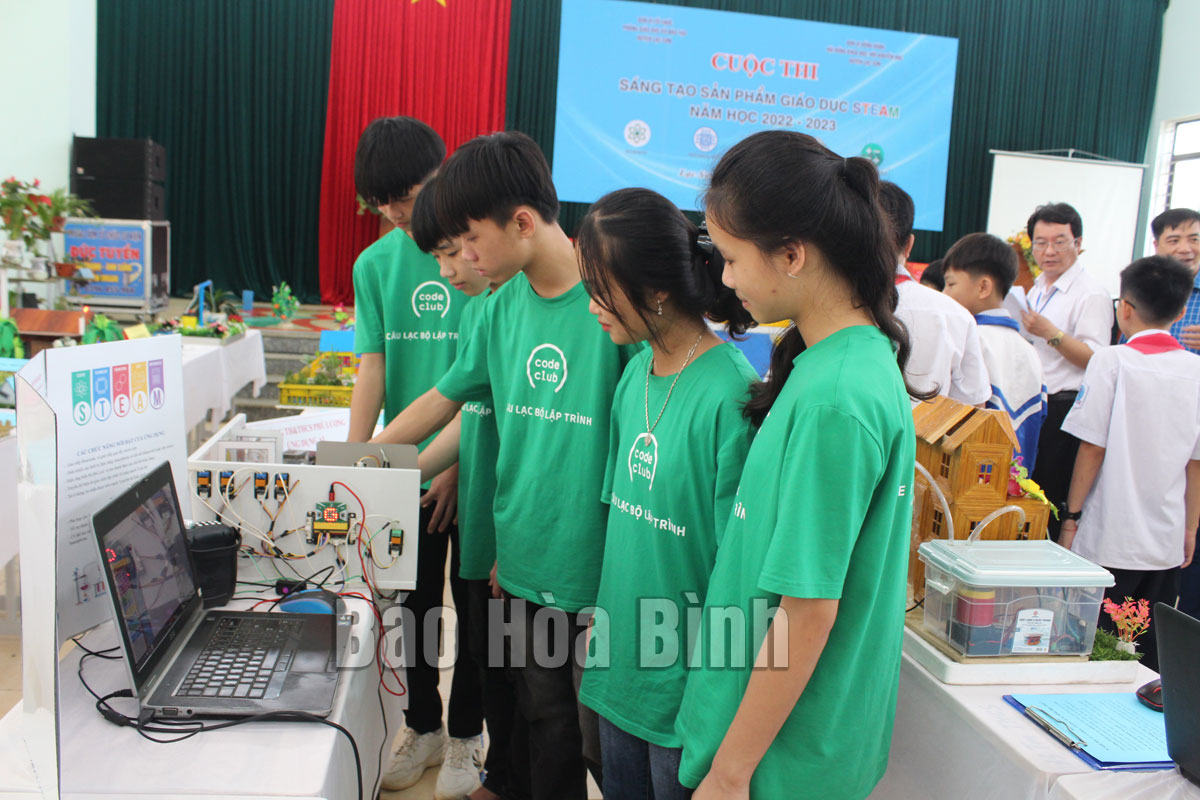
(HBO) – As a mother of a primary school student in Hoa Binh city, Nguyen Thi Oanh feels compulsory to see her children use the app vuihoc.vn to review her lessons during the summer vacation.

Pupils in
Lac Son district, Hoa Binh province, participate in a contest on applying IT to
make educational products.
Oanh said that she highly values schools’ efforts in applying
information technology in teaching.
Schools in Hoa Binh city provide students with online learning
programmes not only for self-learning in summer vacation but also during the
school year.
E-learning is one of the outstanding results achieved by the
province’s education and training sector in its efforts to promote digital
transformation. The application of IT has contributed greatly to improving the
efficiency of teaching and learning in schools. Currently, all educational
institutions in the province have access to Internet. All general education
institutions have used school management information systems (SMAS, VNedu). All
teachers of secondary and high schools in the province have been granted LMS
and LCMS system accounts to serve their work and online learning. Up to 45% of
primary school students and 65% of secondary school students in the province
are offered Computing Science.
Recently, the province’s Department of Education and Training continued to
accelerate the digital transformation by coordinating with the Hoa Binh
Telecommunications Company to implement a comprehensive digital transformation
programme. Accordingly, the sector continues to give resources, promote IT
applications and digital transformation to meet the requirements of innovation,
and improve training quality.
In addition to the remarkable results of digitalisation, the
province’s education sector continues to improve school infrastructure.
Up to now, 305 out of
the 516 preschools and schools in the province meet national standards. All
5-year-old children in the province go to school. The province have reached
Level 2 of illiteracy eradication standards, and Level 3 of universal primary
education. Nine out of the 10 districts and city realised universal secondary
school education at Level 3 while one district realised universal secondary
school education at Level 2.
The Department of Education and Training of Hoa Binh province held a conference on March 18 to review the performance of the "Safe and Happy School" Project and set out tasks for 2025. The project, funded by the Taiwan Fund for Children and Families (TFCF), aims to create a safe, inclusive, and supportive learning environment for students. The event saw the attendance of representatives from the TFCF and 26 beneficiary schools.
With over 70% of their workers being women, trade unions across industrial parks (IPs) in Hoa Binh have been actively safeguarding their legal rights and interests while implementing initiatives to improve their income and well-being.
In recent years, the Hoa Binh provincial General Hospital has continuously innovated itself and improved the quality of medical services to meet the increasing needs of local people. With substantial investments in infrastructure and modern equipment, along with a team of highly qualified doctors and nurses, the hospital has gradually established itself as one of the leading medical units in the Northwestern region and a trusted destination for healthcare for people inside and outside the province.
From mastering the fundamentals of programming to achieving national recognition, the Programming Club of the Le Van Tam Primary School (STAR LVT28) in Hoa Binh city has made remarkable strides in the field of robotics.
The Ho Chi Minh Communist Youth Union Committee and the Vietnam Youth Federation chapter of Hoa Binh province organised a programme on March 12 to launch the "Digital Literacy" movement and an online quiz on the resolutions of the Vietnam Youth Federation congresses at all levels, as well as the Politburo's Resolution No. 57-NQ/TW on breakthroughs in the development of science, technology, innovation, and national digital transformation.
As climate change grows more unpredictable, the development of production forests has become essential - not just for economic growth, but for safeguarding the environment and maintaining ecosystem balance. By boosting local incomes, curbing natural disasters, preventing soil erosion, and protecting water resources, these forests play a crucial role in sustainable development.



